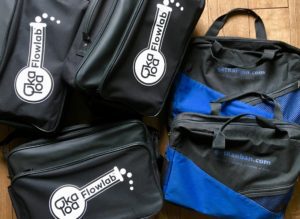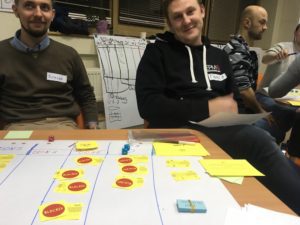Here is a quick index of all games and simulations listed in the article:
Online
- Kanban board game (Software development Kanban Game)
- Okaloa Flowlab
- Featureban
- FlowBan
- TWiG – The WiP Game
Offline
- getKanban
- Okaloa Flowlab
- Featureban and Changeban
- KanbanPizza
- Kanban Policy Game
- The Flow Hour
- AskKanban!
- GWAN (Game Without a Name) aka Spry Agility Board Game
- The Scrumban Game
- NoEstimates Game
- CarBan game
- Scrumban simulation
- TWiG – The WiP Game
- The Lego Kanban Game
- Ubongo Flow Game
- Lean Lego Game
- The Penny Game
- Paper Boats
- The Sudokuban
- Multitasking Name Game
- Fire Dice
- Lean Startup Snowflakes
- Agile Airplane Game
- The Dot Game
- The Motor City
- Kanban Electric Vehicles (Kanban EV)
- The Bottleneck Game
- Ball Point Game
- The Ball Flow Game
- The Beer Game
Have you ever wondered how to explain the ideas behind flow-thinking and Kanban through experience? One way to do this is through games or simulations. However, finding a comprehensive list of Kanban games in one place can be challenging. In this article, we will provide you with a list of Kanban games and simulations that you can use to help teach flow-thinking and Kanban principles.

In this article, I will use the terms “games” and “simulations” interchangeably, as I’ve found that the distinction between the two can be subjective and depends heavily on facilitation style. Additionally, based on my extensive experience facilitating different games and hearing from others within the community, I’ve observed that participants’ learning from the game depends more on the facilitation and debriefing of the activity than on the activity itself. Thus, the potential power of a game may come from additional options on how to run it, which may or may not be described in the official documentation.
Below, I’m going into a full list and my experience of specific games (of course, when I have experience – I facilitated more than half, but not all). This list is not expected to be a historical reference for all games – some games were available in the past, but already disappeared, and they are not here… There is no particular order to this list. Overall there are 20+ games listed.
getKanban
Source: getkanban.com
Author: Russell Healy
Timing: 2.5h–full day (depending on how you play and what you debrief)
~Year created: 2009
License: closed/available for purchase.
The getKanban game is arguably the most widely used full-featured board game for illustrating most of the aspects of Kanban. It comes with well-described facilitation instructions, making it the default choice for new Accredited Kanban Trainers of Kanban University to use in the Kanban System Design class. It’s worth noting that Russell Healy, the game’s author, received the Brickell Key Award in 2011 for getKanban.

Several game modes are available with varying total durations, with the most advanced mode taking over half a day to complete (including debriefing). It’s also worth mentioning that, apart from the version sold to the public (currently version 5), an older version (version 2) is freely available for download and use from the site. This version is widely used by PSTs (scrum.org trainers) who teach “Professional Scrum with Kanban” classes.
While there has been a circulating idea in the community of creating and supporting alternative scenario flows (alternative sets of daily events), I haven’t come across any realizations of this yet.
The game touches on various concepts, including push vs pull, board design, WIP limits, probabilistic forecasting, Lead Time, Throughput, blockers and defects, policies, Lead Time Distribution chart, Classes of Services (CoS), Service Level Agreement (SLA), Control Chart, Cumulative Flow Diagram, and more.
For additional resources, Kanban University trainers can access an internal webinar recording on the topic of tips and tricks for getKanban facilitation. In this recording, I and Alexei Zheglov share our experiences with the game, which is available through the internal platform COYO. Another helpful resource is Alexei’s article on the topic.
Kanban board game (Software development Kanban Game)
This is an online game inspired a lot by getKanban. It provides 2 scenarios (via 2 different sets of event cards: getKanban v2 (freely available, quite an old one…) – 21 days of gameplay and its own events, and 35 days of gameplay.
Source: www.kanbanboardgame.com
Okaloa Flowlab
Source: okaloa.com/flowlab
Author: Patrick Steyaert
Timing: 1.5h–full day (depending on how you play and what you debrief)
~Year created: 2016
License: closed/available for purchase.
Another standout in the field, Okaloa Flowlab offers a comprehensive experience of flow, various aspects of Kanban, graphs, and metrics. With several options available, anyone can purchase the basic teamFlow set. However, the advanced simulations, including Upstream (end-to-end), multi-team, and stuff liquidity simulations, are only accessible after attending an in-person 2-day facilitation class. Many Accredited Kanban Trainers, myself included, use this family of simulations in certification classes, such as Kanban System Design and Kanban Systems Improvement.

Compared to getKanban, Flowlab offers more flexibility and can be thought of as a constructor of simulations. It is more open, but also more prone to facilitation flaws, making it important to have experience in facilitation. Expect to see various simulations based on Flowlab, such as the “Capacity allocation” simulation by Susanne and Andreas Bartel. I’m constantly experimenting with this set and have built and used simulations such as “metrics exploration” and “probabilistic forecasting.”
There is a community of practitioners and a Slack channel for communication, providing the support you’d expect in today’s world. You can also access the online version of Okaloa Flowlab, which includes both the basic version and advanced simulations.
Featureban and Changeban
Source: agendashift.com/resources/featureban and agendashift.com/resources/changeban
Author: Mike Burrows
Timing: 1.5–2h
~Year created: 2014
License: Creative Commons (CC)
These games offer a quick and engaging way to demonstrate certain aspects of flow and challenge preconceived notions. I’ve included both games here as they are quite similar in nature. Featureban was the first of the two, with Changeban being a Lean Startup-inspired derivative of Featureban that appeared later. While the game mechanics are similar, the learning objectives differ due to the different contexts they are designed for.

The games are constantly evolving, with changes being made to some of the in-game dynamics. However, all versions of the games are available, so you can choose your preferred option. There is a supportive community of practitioners, and a dedicated Slack channel within AgendaShift for communication and sharing ideas.
The online version of Featureban 3.0 is available!
Source: tools.flowfast.io/featureban
KanbanPizza
Source: agile42.com/en/agile-teams/kanban-pizza-game/
Author: Ralf Kruse from Agile42 (by the time of creation)
Timing: 60-90 mins
~Year created: 2011
License: CC

This next game is widely known and recognized within the community, despite not being as full-featured as some others. What sets KanbanPizza apart is its unique focus on physical space and team collaboration. The game challenges you to design your working environment within your team, providing a hands-on approach to understanding the principles of Kanban and flow.
KanbanPizza has been available for some time now and its CC license has helped to make it even more accessible to the community. While it may not be the default choice for introducing Kanban or flow thinking, it certainly has a valuable place in a variety of situations.
Kanban Policy Game
Source: github.com/kedehub/kanban_policy_game
Author: Dimitar Bakardzhiev
Timing: 60-90 mins
~Year created: 2016
License: CC
This game also helps to explore some of Kanban aspects (pull, WIP limits, collaboration) and how applying those effects flow of work with a focus on policies and making those explicit.
The Flow Hour
Source: github.com/rodrigoy/The-Flow-Hour
Author: Rodrigo Yoshima
Timing: 1.5-2h
~Year created: 2010
License: CC.
Simulation/activity created by Rodrigo where in one hour during several rounds/iterations students are introduced to some of Kanban aspects. This game was inspired by Extreme Hour. This is not CC (Creative Commons), so, please, check the license before using it.
AskKanban!
Source: blog.huge.io
Author: Brendan Wovchko
Timing: 10-15 mins
~Year created: 2016
License: closed/available for purchase.
It is nice to have some diversity on this list. Most games and simulations here are built around either the board and moving cards on it or building something over time. This one is very different. It is super simple. The aim is to put a bit of gamification to improve staled daily standup meetings. There is a great 17 mins video available with detailed explanations and instructions on the game. You can create your own cards or purchase printed ones from HugeIO.
FlowBan
Source: www.strione.com/flowban/
Author: Mauro Strione
~Year created: 2020
License: n/a
Pure online simulation, is the very first in this list of such kind. You can check a 2-minute video demonstration to get a quick idea about this simulation. It is still in the beta phase and is under development, but to me looks very interesting. To me, it looks quite similar in a lot of aspects to getKanban.
GWAN (Game Without a Name) aka Spry Agility Board Game
Source: spryagility.co.za/board-game/
Author: Berto Coetsee
Timing: 45-90 mins
~Year created: 2017
License: n/a
A game without a name touches on concepts of flow, batch size, context switching, limiting WIP, and the cost of delay. Good simulation game to drive in the concepts. Video instruction and all materials are available.
The Scrumban Game
Source: github.com/dimiterbak/scrumban_game
Author: Dimitar Bakardzhiev
Timing: 90-120 mins
~Year created: 2018
License: CC
This game drives you through the simulation of evolutionary change in the context of software development. Interestingly, it simulates the XIT team at Microsoft, which is a case study, often used on the second day of the Kanban System Design fundamental class. It is the second game in a list from Dimitar, it has excellent facilitation instructions and all the needed materials. The game gives players an opportunity to explore most Kanban practices including Flow Efficiency, Due Date Performance, and SLE performance (which are relevantly rare for games/simulations).
NoEstimates Game
Source: noestimates.wordpress.com/get-the-noestimates-game/
Author: Matthew Philip
Timing: 90-120 mins
~Year created: 2016
License: CC 4.0
Excellent game to learn about NoEstimates, forecasting, and sources of variation in software delivery. Freely available to download (from GitHub) to print and play or you can buy a professionally printed set.
CarBan game (aka CarBan Kanban Simulator)
Source: github.com/RubenOlsen/CarBan
Author: Ruben Olsen Lærk
Timing: 90-120 mins
~Year created: 2016
License: n/a
Another great pre-defined simulation that will drive you through learning how to use the Kanban board, and other artifacts in a team setting. According to Ruben, it has also an advanced mode that simulates the multi-team development process.
Scrumban simulation
Source: simu-learn.net/scrumban
Author: Sangeetha Sridhar & Koen Vastmans
Timing:
~Year created: 2018
License: CC
One more Scrumban simulation is on our list. Inspired by the Kanban Pizza game (see above) and No Estimations Game. All needed materials are available for you to try this one out.
TWiG – The WiP Game
Source: leanability.com/en/twig/
Author: Klaus Leopold
Timing: 1.5-2h
~Year created: 2018
License: CC

I’ll leave aside all discussions and theories of what other simulations this game looks similar to. On its web page, it is said that: “TWiG is inspired by the simplicity of Featureban and the charming, event-driven getKanban”. From my experience, it is still closer to the “quick/simple” end of the spectrum…
There is an online version of TWiG available built on another electronic tool (ActionableAgile).
Source: actionableagile.com/play-twig/
It would be strange if simulations based on Lego won’t get here, right..? We have several…
The Lego Kanban Game
Source: slideshare.net/lunivore/the-lego-kanban-game-85817610
Author: Liz Keogh
Timing: 60-90mins
~Year created: 2017
License: CC
Even though Slideshare slides are the only source for this, it is enough to run a simulation. Concepts covered here: cross-functionality (collaboration), pull, and process of organizing the workspace.
Lego Flow Game
Source: availagility.co.uk/resources/games/lego-flow-game/
Author: Karl Scotland and Dr. Sallyann Freudenberg
Timing: 60-90mins
~Year created: 2013
License: CC
As with the majority of Lego-based simulations, the structure is similar – there are several rounds when small teams are building something with Lego with different rules/policies in between different rounds. In this case, there are 3 patterns to experience: “Batch and Stage Driven (Waterfall-like)”, “Time-Boxed (Scrum-like)”, and “Flow-Based (Kanban-like)”.
Ubongo Flow Game
Source: teamworkblog.de/2019/07/the-ubongo-flow-game-instruction-and.html
Author: Jan Fischbach
Timing: 60-90mins
Year created: July 2015
License: n/a
Interesting combination of Lego Flow Game (described right above) – all mechanics (3 rounds, learning objectives, etc) are used from there, but instead of lego bricks, Ubongo game material is used. Apart from the English description (link above), there is one in German. Slides are available in both German and English.
Lean Lego Game
Source: dtsato.com/blog/work/lean-lego-game/
Author: Danilo Sato & Francisco Trindade
Timing: 1.5-3h
~Year created: 2008
License: CC
This one was inspired by “The Lego XP Game” and appeared and matured inside ThoughtWorks. Concepts touched on here: push vs. pull, Kanban, Waste, Kaizen.
I run it once back in 2014 at a conference, I do remember it went and was accepted really well, but required quite a lot of Lego bricks to run ~;)
The Penny Game (aka “Penny Flow”, aka “Pass the pennies”, aka “Coin Game”)
Source: tastycupcakes.org/2013/05/the-penny-game/
Author: kind of hard to track sources also considering a number of variations. It looks like improved by multiple practitioners within the agile community. The first mentions go back to Joe Little, George Dinwiddie, Jeff Sutherland, and Henrik Kniberg.
Timing: 20-45mins
~Year created: 2008
License: CC
Another very simple game showing concepts of small batches, constraints, and communication. You have to have plenty of coins for the game, which is harder and harder to expect just to gather from the group… 😉
The online version of The Coin Game has been developed by Solutioneers.
Source: solutioneers.co.uk/coingame/
Year created: 2020
There is also a quick facilitator guide available.
Paper Boats
Source: leanability.com/en/blog/2015/09/flow-exercise-building-paper-boats/
Author: Klaus Leopold
Timing: 45-60mins
~Year created: 2016
License: n/a
Another simulation for exploration of the difference between push and pull, this time via paper boats assembly line. One may find some similarities with “The Lean Cups Game“. Martin Aziz and Fernando Cuenca run this game for 100+ people and AgileTO meetup. They created an excellent Facilitation guide and provided other supporting materials. Now you can run after a realistic preparation time.
The Sudokuban
Source: unbounddna.com/resources/agile-games/sudokuban-a-kanban-in-action-puzzle-game/
Author: Renee Troughton and Craig Smith
Timing: 45-60mins
~Year created: 2013
License: CC
Apart from the usual suspects (WIP Limits, Pull, Flow, Lead Time), this one brings expedites into the picture. And yes, you have to be aware of Sudoku puzzles, as it is part of mechanics.
Multitasking Name Game
Source: crisp.se/gratis-material-och-guider/multitasking-name-game
Author: Henrik Kniberg
Timing: 30-45mins
~Year created: 2009
License: CC
Super simple, yet super powerful quick simulation to show problems with multitasking. Now, this exercise is part of the Team Kanban Practitioner class. I learned it from Mary Poppendieck in 2009 and she adapted it from Henrik. I’ve run it multiple-multiple times with great success.
Fire Dice
Source: theagilefactor.com/fire-dice-the-game/
Author: Jason Tice
Timing: 45-60mins
~Year created: 2014
License: n/a
Concepts explored: applying ToC to knowledge work, limiting WIP, and finding batch sizes using process analytics.
Lean Startup Snowflakes
Source: tastycupcakes.org/2012/05/lean-startup-snowflakes/
Author: André Dhondt
Timing: 60-90mins
~Year created: 2012
License: CC
Concepts touched: customer discovery, collaboration, waste, and acceptance criteria.
Agile Airplane Game
Source: oledru.free.fr/agile/game/AgileAirplaneGame/AgileAirplaneGame-InstructorNotes.pdf
Author: John Heintz
Timing: 1-2h
~Year created: 2011
License: CC
Concepts touched: customer discovery, collaboration, waste, acceptance criteria, push/pull, kaizen.
The Dot Game
Author: Al Shalloway
Timing: 45-60 mins
~Year created: 2011
License: CC
Concepts touched: push/pull, collaboration, kaizen.
Another simulation that I had the pleasure of running many years back. Went smoothly 😉 It is based on Lean Manufacturing Cup Game.
The Motor City
Source: yorkesoftware.com/2017/10/17/motor-city-a-kanban-game-overview/
Author: John Yorke
Timing:
~Year created: 2017
License: closed/available for purchase.
Concepts touched: Kanban, WIP limits, and the Theory of Constraints.
The game is to be played in groups (like a lot of others in this list as well) of up to 4 people (per one set). Through the simulation, you are going to assemble cars like in the golden age of the automobile industry.
Kanban Electric Vehicles (Kanban EV)
Source: eaglegames.net/Kanban-EV-p/102293.htm
Author: Vital Lacerda
Timing: 90-120 minutes
Year created: 2020
License: closed/available for purchase.
Concepts touched: Kanban, Lean manufacturing.
Pretty complex game with extensive rules (you may check it, it is available online via the link above). Not much about Kanban, even less about knowledge work…
The Bottleneck Game
Source: agilecoach.net/coach-tools/bottleneck-game/
Author: Pascal Van Cauwenberghe, Portia Tung
Timing: 2-3h
~Year created: 2009
License: CC
This simulation helps you to apply the Five Focusing Steps from the theory of constraints (ToC).
Ball Point Game
Source: borisgloger.com
Author: Boris Gloger
Timing: 45-90min
~Year created: 2008
License: CC
Even though this one was initially created for teaching Scrum (and probably still mostly used for that), it is quite a generic game. Depending on your objectives you may focus on different learning objectives. I was running it multiple times. Some of the possible teaching points (more relevant for this article) are teamwork, kaizen, types of waste and waste reduction, flow, estimating, and probabilistic forecasting.
So, as you can see, even with this one you can teach quite a few concepts behind the flow thinking, Karl created a version more focused on flow. See below…
The Ball Flow Game
Source: availagility.co.uk/2011/07/19/running-the-ball-flow-game/
Author: Karl Scotland
Timing: 45-60min
~Year created: 2010
License: CC
Very close to the initial game with rules/dynamics (rounds are not limited by timebox but rather by the number of balls passed), with a focus on flow metrics like Lead Time, Throughput, and charts like Cumulative Flow Diagram.
The Beer Game
Source: http://web.mit.edu/jsterman/www/SDG/beergame.html
Author: MIT’s Sloan School of Management
Timing: 45-60min
~Year created: 1960th…
License: n/a
This game is likely the oldest on the list. It offers insights into customer demand, knowledge distribution, and communication. As the description says, “The game provides a vivid experience with a complex system, where players can see how the collective results of individually sensible decisions can be disastrous; where they can see the connection between the structure of a system and the dynamics it generates.” Interestingly, the game is often referred to as a “management flight simulator” – a concept that Patrick Steyaert heavily utilizes in his Okaloa simulations (which is not surprising given the influence of John D. Sterman). It may be surprising for some to realize that many principles and concepts used in “cutting-edge” Agile games and simulations have been around for half a century.
Epilogue
In this article, I have provided a list of Kanban games and simulations that you can use to experience and teach flow-thinking and Kanban principles. However, it’s worth noting that there is a thin line between Kanban simulations and Lean simulations, and generic Agile simulations and games. We have limited the scope to Kanban-related stuff only, as there are a lot of Agile games available. If you want to explore more in this area, I suggest checking out Lean Simulations or TastyCupcakes, which have a wide range of agile and lean games. I hope you find this list useful and enjoyable! If you think I missed your favorite game, please let me know.
Enjoy playing!
